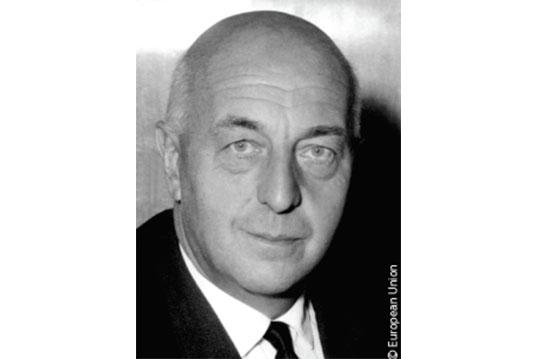As a member of the Dutch resistance during the Second World War, Sicco Mansholt witnessed the horrors of the famine that swept across the Netherlands towards the end of the conflict. Once the Netherlands had been liberated, he vowed to work tirelessly to prevent the return of both war and destitution to Europe.

The organisation of markets should be viewed as a means to achieve the ultimate goal of a single market.
Life and times
Mansholt grew up on a farm, and drew on his experiences in his role as Minister of Agriculture in the Dutch post-war government. With a dire shortage of food and a crisis looming, Mansholt took a number of measures to restore food supplies quickly. He set minimum prices for the most important agricultural products combined with import taxes and support for exports. He was convinced that the whole of Europe needed to become self-sufficient and that a stable supply of affordable food should be guaranteed for all.
A vision for Europe
A convinced European federalist, Mansholt dreamt of a common agricultural policy for Europe. In 1950, he developed a plan for a common market for agricultural produce in Europe with a supranational governing structure.
Though it failed at the time, it was later revived and was the inspiration behind the agricultural policy of the European Economic Community. Mansholt got his chance to launch his plans for a common policy when he became Commissioner for Agriculture in the very first European Commission in 1958.
Sicco Mansholt explaining his vision for Europe’s agricultural sector
Sicco Mansholt – 10 December 1968, Brussels
The Commission has just explained to the Council of Ministers its views on what needs to happen in Europe's agricultural sector over the next 10 years.
It informed the Council that first a memorandum will be submitted regarding how agriculture is structured, in the broadest sense of the term.
The measures involved are so far-reaching, not just financially but also structurally, that the Commission feels a memorandum is appropriate.
Publications
More about Sicco Mansholt’s life, work and contribution to the European project
